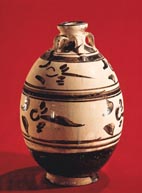| Legole.Com Discover china. Explore the beauty and wonder of the land, people, and culture of China. |
 |
|
|
 |
| |
 Although they practiced a form of shamanism, the Mongols did not impose this on their subject races. During the Yuan period there was religious freedom albeit with some degree of favor to one group at the expense of another. Their reliance on divination in deciding upon a course of action led to the use of Daoist adepts. The Taoist leader, Changchun, who had a famous meeting with Genghis Khan in 1219, gained privileges for his followers over Buddhists. Ogodei issued an edict that all Daoist and Buddhist monks over the age of fifty should pass an examination on the scriptures of their chosen religion. This was done in an effort to restrict the very considerable growth in their numbers. A series of public debates were held between 1255 and 1258 to settle difference between Taoists and Buddhist. Predominant among these debates was the matter of claims to monastic properties and Kublai found in favor of the Buddhists much to the annoyance of the Taoists. Although they practiced a form of shamanism, the Mongols did not impose this on their subject races. During the Yuan period there was religious freedom albeit with some degree of favor to one group at the expense of another. Their reliance on divination in deciding upon a course of action led to the use of Daoist adepts. The Taoist leader, Changchun, who had a famous meeting with Genghis Khan in 1219, gained privileges for his followers over Buddhists. Ogodei issued an edict that all Daoist and Buddhist monks over the age of fifty should pass an examination on the scriptures of their chosen religion. This was done in an effort to restrict the very considerable growth in their numbers. A series of public debates were held between 1255 and 1258 to settle difference between Taoists and Buddhist. Predominant among these debates was the matter of claims to monastic properties and Kublai found in favor of the Buddhists much to the annoyance of the Taoists.
The Tibetan lama, Phags-pa, played a leading role in these debates and as his form of Buddhism had more appeal to the Mongols, with its colourful pageantry and emphasis on magic, he was appointed State Preceptor in 1260. Tibetan Buddhism took a firm hold in China and the Mongol Emperors were to receive Buddhist legitimation.
The Mongol conquerors treated Confucianism with contempt at the outset but their attitude was to change. They recognized the value of Confucian officials in government. The Neo-Confucianism which had spread in the South became accepted when the country was unified. Confucian scholars were faced with a problem. Should they stay in office and support the new regime or should they retire and merely follow scholarly activities? Xu-Heng (1209-81), Kublai's chancellor at the Imperial College chose to play an active role. He promoted the Neo-Confucian text known as the Xiaoxue, the Elementary Learning which concerned the teaching of the young. By contrast Liu-Lin (1249-83), a distinguished scholar, refused to take office under Mongol rule. He alleged ill health, which may have been true as he died two years later. Xu-Heng is said to have said that unless he was prepared to serve the new dynasty, the Confucian way could not prevail. Liu Yin's response was that the Confucian way could not be respected if scholars accepted Mongol masters. His response is seen as a protest against the Mongol empire and has been described as an example of Confucian eremitism, a withdrawal of the scholar from the world of affairs to that of self-realization.
Drama became firmly established and some 700 plays, which included singing and dancing, were written under the Yuan. Some 150 of these have survived and form what has become to be known as the 'Yuan northern drama', as many were written for performance in Beijing. The modern Beijing opera is descended from them and many of the plays have been translated into western languages, such is their popularity. On the whole, the Yuan period saw a proliferation of literary activity in both drama and in fiction; a common element was that both were written in the vernacular which gave them access to a wider audience and readership. |
|
|
 |
|
|
 |
|
